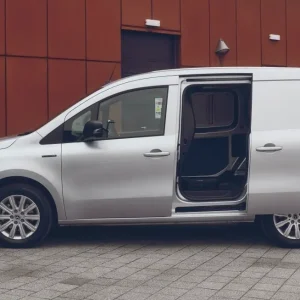What does Richard Chamberlain do on his day off? Does he ever actually get a day off?
It would be surprising if he did, given that he is now the UK commercial vehicles director for global motor industry behemoth Stellantis. This means he is ultimately responsible for van activities at Citroen, Peugeot and Vauxhall, as well as acting as country manager for Fiat Professional; Stellantis owns all four brands.
When What Van? caught up with him he was wearing his Fiat Professional hat at a press event in Coventry. The event was centred around the latest Fiat Professional Ducato, now in its eighth incarnation; our Van of the Year for 2022.
Ducato won this accolade thanks in part to its advanced driver assistance systems (ADAS) technology. The newcomer meets level two requirements so far as its autonomous ability is concerned, while it is still a long way from being driverless.
Chamberlain expects the 2.2L 140hp diesel to be the most popular power choice among Ducato customers, but adds that the advantages of the more powerful 180hp version of the same engine should not be overlooked. Nor should the virtues of the optional nine-speed ZF automatic gearbox be ignored, he insists.
While Ducato is best known as a van, Fiat Professional is busy highlighting its abilities as a chassis cab, with conversions involving body builders VFS (dropsides and tippers) and alloy bodies (box vans).
Whichever Ducato you opt for, odds are that you will have to wait many months for it to be delivered thanks to the semiconductor shortage that is bedevilling all motor manufacturers.
“If you order one from the factory now, then depending on the specification it probably won’t arrive before the end of the year,” Chamberlain admitted. “That said, some of our dealers have a limited amount of vehicles they have ordered for stock coming through,” he added.
There is significantly better news so far as the battery-electric E-Ducato is concerned. “With E-Ducato we’re looking at a lead time of from 16 to 20 weeks,” he said.
Extended delivery times mean it is looking unlikely that Fiat Professional will see a big increase in its total registrations this year.
“I think the overall market will be about the same size as it was in 2021,” he said. “I think our volumes will be about the same as they were last year too, at around 11,000 units.”
Long waits for new vans to arrive are playing havoc with second-hand sales. Fleets are hanging on to the vehicles they have got until their replacements appear, and not releasing them onto the used market.
As a consequence, second-hand light commercials are in woefully short supply, and prices have skyrocketed. So far as Chamberlain can see, there is hardly any good-quality used stock available for buyers to purchase.
In addition to the new Ducato, Chamberlain and his colleagues are rolling out the latest Scudo. Not surprisingly, it shares the same basic design as Citroen’s Dispatch, Peugeot’s Expert and Vauxhall’s Vivaro – the same model is being sold by Toyota as the Proace under a joint-venture deal with Stellantis – and an electric Scudo is forming part of the model mix.
Last year’s Commercial Vehicle Show saw Vauxhall exhibit a Vivaro prototype fitted with a hydrogen fuel cell.
So will there be a hydrogen fuel cell Scudo soon?
“The timing has yet to be confirmed,” Chamberlain replied.
“The problem with hydrogen so far as the UK is concerned is that our government simply doesn’t have it on its radar,” Chamberlain said. “By contrast, the French and German governments are busy putting in the necessary investment.”
Nor is he impressed with the UK government’s decision to cut the grant that was intended to encourage light commercial owners to switch to zero-emission battery-electric models.
“By doing so it’s shown itself to be anti-green van,” he contended; an extraordinary stance to take in the wake of last November’s COP 26 climate change conference in Glasgow.
As reported in the January 2022 issue of What Van?, the plug-in vehicle grant scheme for large vans (2.5t to 3.5t) has been slashed from £8,000 to £5,000. Grants for small vans (less than 2.5t) have been reduced from £3,000 to £2,500.
No matter how it is powered, your light commercial is likely to cost you more money to acquire, thanks to escalating raw material costs. Chamberlain can however offer a crumb of comfort.
“Today’s models have far more technology in them than vehicles did ten years ago, with features such as ADAS and satellite navigation,” he pointed out.
Agreed, they are more expensive. “But you’re getting one hell of a lot of van for your money,” he said.





